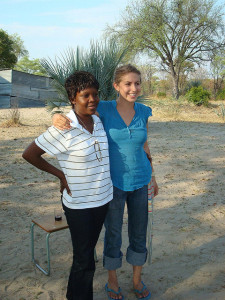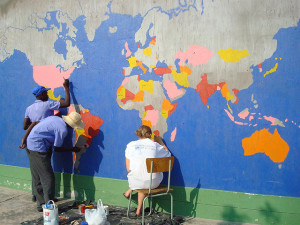Do you ever feel like practically everyone is jet setting absolutely everywhere all the time while you saved and scraped for months just to take a long weekend and drive yourself across state lines? Local travel is seriously underrated, but if you are ready to up your game and travel internationally or long term, then let’s talk finances. Itinerary listicles and fabulous profile pics from each wonder of the world should really come with a reality price tag.
 How are people doing it? Saving and sacrifice are not the most glamorous social media topics, so we end up thinking that we are doing life wrong, that we should all “quit our boring desk jobs to travel the world and never look back.” But some of us like our jobs. Some of us find our passion, identity, and sense of purpose in our jobs. Some of us haven’t found that sense of purpose yet, other than a desire to share and give back, as opposed to the fleeting consumerism that can fill up our preciously few vacation days. Whatever your story, you are most likely here because you want to add more stories to it.
How are people doing it? Saving and sacrifice are not the most glamorous social media topics, so we end up thinking that we are doing life wrong, that we should all “quit our boring desk jobs to travel the world and never look back.” But some of us like our jobs. Some of us find our passion, identity, and sense of purpose in our jobs. Some of us haven’t found that sense of purpose yet, other than a desire to share and give back, as opposed to the fleeting consumerism that can fill up our preciously few vacation days. Whatever your story, you are most likely here because you want to add more stories to it.
This is not an instructional guide on how to become a digital nomad. Below are some ideas and resources to finance your travels while bolstering your CV so you can become an even more professional, well-traveled and cultured badass bitch than you already are. Let’s start easy.
1. Teach English
 This is one of the easiest and most immediate ways to get a job abroad. If you have a degree, you are eligible for most TESOL or TEFL programs. What’s the difference? There isn’t one really. If you’re interested in teaching, Asia is your biggest market, with South Korea and Singapore dishing out the highest compensation, but with a high cost of living to match. There are also plenty of jobs in Thailand, Vietnam, Cambodia, Indonesia, and Japan. Poke around some of the most trafficked jobs boards.
This is one of the easiest and most immediate ways to get a job abroad. If you have a degree, you are eligible for most TESOL or TEFL programs. What’s the difference? There isn’t one really. If you’re interested in teaching, Asia is your biggest market, with South Korea and Singapore dishing out the highest compensation, but with a high cost of living to match. There are also plenty of jobs in Thailand, Vietnam, Cambodia, Indonesia, and Japan. Poke around some of the most trafficked jobs boards.
There are also plenty of jobs available in the Middle East, particularly for female lecturers at Saudi Universities, as most of their educational institutions are gender segregated. The pay is high and the cost of living is practically a non-issue, because most foreign teachers live in gated communities with all expenses paid by their employer. The amenities provide a comfortable home, but female teachers are mostly sequestered to it. Gated house with pool? You’ll be expected to cover up outside the gates. Driver provided by university? Because you can’t. And alcohol is illegal (teenagers all day and no wine all night…eesh). However, this is becoming a more popular way for young female graduates to pay off student loans in a year or two, but it requires a certain stick-to-itiveness. And you’ll certainly have some stories and cultural perspective to walk away with.
In the EU, it’s much more challenging for Americans to get jobs, but not impossible. Your chances are much higher if you are a fully qualified teacher with a content specialty and experience.
If you’re not?
Get your TESOL, TEFL, or CELTA certificate from an accredited program, such as http://www.americantesol.com. You pay your tuition (around $1500), flight, and meals, they give you board and a quality training program that makes (mostly young) graduates comfortable and confident in front of the classroom. They guarantee you a job upon completion. This won’t pay as much as a full teacher qualification, but you’ll struggle to find a job without one of these qualifications.
2. Become an Au Pair
If you like kids but hate grammar? Become and au pair! This is not for everyone. You will have the experience of living with a family and most likely learn a language, but your behavior will be noted by the family. If you’re a wild child used to answering only to yourself, this may feel a bit like having your wings clipped. If you love the support and togetherness of a family unit, then it could be perfect. And this is one of the few professions where female applicants are preferred.
http://www.aupaircare.com/au-pairs/program-overview
https://www.aupairworld.com/en/au_pairs
3. Working Holiday
Are you over 30 (like me)? Then skip ahead. If not, there are a few networks of countries, especially in the Commonwealth, that provide easy work visas to people under 30. The most popular destinations seem to be Australia and New Zealand, with farming and ranching industries in highest demand. Interested in sheep and acquiring good stories and a skill? Why not spend up to 24 months as a jillaroo?
http://www.visabureau.com/australia/working-holiday-visa.aspx
Depending on your country of citizenship, there may be some limitations or stipulations on where you may apply for a work holiday visa. If you’re not from the Commonwealth, check out the link below:
http://www.gooverseas.com/blog/americans-guide-working-holiday-visas
These visas are an excellent opportunity for educated travelers, especially if you are limiting your expatriation to one or two years. Each country has different requirements for the applicants’ age, education, and field, so do your research before you apply.
4. Volunteer
 Do you have time? A big heart? A desire to leave the world a bit better than you found it? Patience? Then volunteering could be a great way to align your ethics and values with your wanderlust.
Do you have time? A big heart? A desire to leave the world a bit better than you found it? Patience? Then volunteering could be a great way to align your ethics and values with your wanderlust.
If you’re American and have two and half years to dedicate, I highly recommend the Peace Corps. Yes, it will be rough, it will be rustic, you’ll be isolated and lonely at times and you’ll become more open-minded about the interpretation of “toilet paper,” but you will do something truly special for a community that will become your second family. Exchange culture, language, skills, and lots of meals. Learn a language. Teach a language. Change lives, change your own. I should write slogans for them.
Peace Corps is perfect for anyone who has debt but would like to volunteer without murd ering their credit. All education debt, mortgage, car payments, you-name-it are put on deferral without interest once you get your acceptance. Your flights, room and board (although on par with the local community, so don’t expect more than a bed and a roof), and health care are covered for the duration of your service. And you receive a small stipend to help you get back on your feet once you’ve completed your 27 months.
ering their credit. All education debt, mortgage, car payments, you-name-it are put on deferral without interest once you get your acceptance. Your flights, room and board (although on par with the local community, so don’t expect more than a bed and a roof), and health care are covered for the duration of your service. And you receive a small stipend to help you get back on your feet once you’ve completed your 27 months.
Also check out the Peace Corps graduate opportunities. Yes, you could even attain a Master’s degree while completing your service.
Not an American citizen? Check out Volunteer Service Overseas (VSO). They have 6 month, 12 month, youth, and corporate volunteer options.
http://www.vsointernational.org
Both Peace Corps and VSO are committed to supporting the work and needs of volunteers with disabilities or medical conditions. Neither require a university degree, but without one you’ll need extensive experience in your field.
Out of New Zealand, Volunteer Service Abroad (VSA)
Not looking or able to give up one or two years? For short term volunteering, especially for you who love the outdoors and have a passion for sustainable agriculture, try:
These kinds of experiences will bring you into more contact with fellow volunteers, which is great for people who aren’t confident about learning a new language to have any social interaction. And you’ll learn some skills and be a part of an enthusiastic, positive group of like-minded travelers.
There are plenty of other volunteering options directly through organizations that interest you, and Fannypack is working on making those connections so we can cater some volunteer and service tourism in the future.
5. Work for a booking agency
If you have a penchant for or experience in customer service, there are plenty of jobs at booking agencies, especially in countries with a high volume tourist industry. If you like the order and tidiness of an office in the daytime, and seek adventure after hours, try agoda, expedia, booking, and more.
https://careers-agoda.icims.com/jobs/intro?hashed=-435739706
http://expediajobs.findly.com/
6. Tech

That’s vague, isn’t it? If you are tech-savvy, meaning you could be hired as tech support in the States or you are adept at web developing, you will find yourself employable all over the globe. Can you program or code? Even better.
You could be a freelance web developer, in which case, I did indeed cover how to become a digital nomad. You are very unlikely to become a digital nomad by creating a beautiful travel blog or website and funding your travels from the ads targeting your unique niche and readership. But you certainly can design websites remotely for a variety of paying customers. A common place to start freelancing is Upwork.
There are also editing jobs as well, which is a boon for native English speakers. You can also try:
Or you can pass out your business card to local businesses, especially in the tourist industry, to help create websites, improve SEO, or become visible on tripadvisor. There are so many restaurants, dive shops, motorbike outfitters, tour operators and more who are trying to get an online presence and climb the ranks of google. If you can help them, you can get paid.
This kind of freelance work is best for the nomadic types, as it is more difficult to get a work visa, and you’ll have to either move around on tourist visas and live out of your suitcase, or do a “visa run” if the country you’re in allows that.
7. Study Abroad

If you in a position to pay rather than earn (possibly both) while you’re living abroad, there is the option of a study abroad placement. Out of school already? There are many universities that offer study abroad internships, or even require them, to pursue a Master’s or PhD program. The most popular are public health and urban planning. Or channel your Indiana Jones and go for archaeology or anthropology. This requires spending and debt, but if you’re in a position to invest in your education, why not travel while doing it?
General Tips for Finding Work Abroad
1. Bring paper copies of your CV
Not all email addresses are used, I have learned. Dropping by -in person- with an old fashioned, hard copy of your resume is still done, and appreciated, in many parts of the world.
2. Complete a background check
Most work visas, and many places of employment will want you to prove you’re not running from a seedy criminal past. DO THIS BEFORE YOU LEAVE!
3. Create business cards
I personally feel like a cheesy impostor with business cards, but people still ask for them. Young people, too. It feels worse to have someone ask you for a card and not have one than to offer one to someone who didn’t ask.
4. Have a comical amount of passport photos taken
Work requires visas, visas require bureaucracy, and bureaucracy requires a fucking ridiculous amount of passport photos. “Like, 10?” You ask? More. “20?” MORE. “More?” FUCKING MORE. Especially if you are arriving in country with no job. Everybody wants two. Why two? No fucking clue.
5. Check local job boards
Join facebook groups, expat (hate that word, but useful) forums, craigslist, and local newspaper classifieds. You don’t always know what’s out there.
6. Look professional
Of course you know not to show up to an interview looking (and smelling) like a backpacker fresh off an overnight train. But check what is considered professional attire in your new country of employment. Are colorful patterns okay, or should you keep it simple? Open toed shoes or high heels acceptable? Is it preferred you wear a skirt? Are you willing to wear a uniform? Must you cover your hair or shoulders or knees? Are you comfortable changing your appearance if it’s deemed “unprofessional?”
7. Network
Like anywhere, who you know is what gets your foot in the door more often than what you know. Especially in close-knit expat or small foreign communities, your connections can point you in directions you could never have accomplished alone.
8. Be confident
You have something to give. You have something people want and want to pay you for. If the days dwindle away and you’ve had no responses to all the applications you’ve sent out, head to the bar. One with a Union Jack or kangaroo sign. Order a drink, unwind, meet some people, rub some elbows, and take stock of all the regular Joes who have somehow found a job. While they loudly mainsplain “What you need to do,” just remind yourself that if they can do it, why not you?
If you have any more helpful ideas or tips as to how to travel and earn money while doing it, please share in the comments.
Find this article interesting or helpful? Like or share it on facebook or pinterest!




